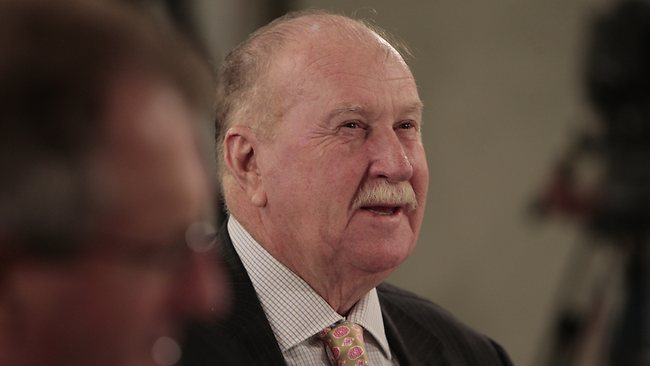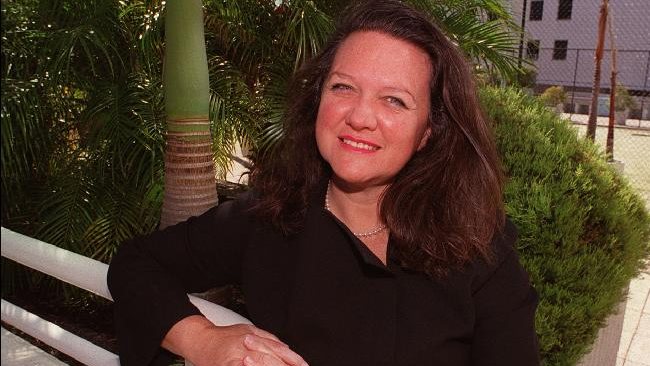Corporate chiefs urge IR overhaul
AUSTRALIA'S corporate elite is urging the government to use Tuesday's budget to overhaul Labor's industrial relations system.
AUSTRALIA'S corporate elite is urging the government to use Tuesday's budget to overhaul Labor's industrial relations system and lift productivity to address the paralysis caused by ongoing political turmoil.
Qantas chief executive Alan Joyce joined his ANZ counterpart, Mike Smith, yesterday in calling for the government to use the budget to restore business confidence and to encourage more labour flexibility.
Woodside Petroleum chairman Michael Chaney said the government should reveal whether it planned any changes to tax policy in the budget and to lift skilled migration levels, while also warning that cost pressures related to falling productivity were threatening the viability of Australian projects.
And Hancock Prospecting chairwoman Gina Rinehart will warn today that instead of Australia doing what it can to keep exporters competitive, it is becoming an increasingly expensive place to do business because of restrictions on overseas labour, extra conditions on fly-in, fly-out workers and demands for more costly Australian content on projects.
"Even without the additional massive costs of the carbon tax and the mining (sic) resource rent tax, Australia is already one of the five most expensive places in the world in which to do business," Ms Rinehart writes in today's edition of the Australian Resources and Investment journal.
Mr Smith yesterday declared that the current political instability was hurting Australia's fragile business and consumer confidence and called on the government to ensure Australia remained competitive against the rest of the world.
"I think the issue of competition is very important for Australia" the ANZ chief executive said. "It's one that we have to look at. I don't mean just our internal competitiveness but globally. We are part of the global economy, we have to realise we compete with every other country in the world."
Mr Joyce said business confidence was "extremely important" to the economy "and business leaders want the government to provide greater certainty".
"We want to see a budget handed down which provides this certainty for Australia and increases business confidence," Mr Joyce told The Australian.
"Australian businesses also want to see increased flexibility in the labour market which will help drive productivity and innovation. Governments and business must work together to find a renewed passion for productivity reform. We can't sit back and rely on the resources boom to sustain us. Tough decisions will need to be made."
The comments come as a new report, obtained exclusively by The Australian , finds that Labor's Fair Work Act is a hindrance rather than a help to productivity and has taken Australia back to the days of prescriptive, centralised awards.
The report, commissioned by the NSW Business Chamber and based on interviews with 70 executives, finds that employers are reeling from an increase in "go-away money" to employees who are increasingly making complaints of unfair dismissal, forcing businesses to make payouts to avoid the distraction and publicity of defending a case.
On top of this, managers were diverted from running their businesses to focus on lengthy and expansive enterprise bargaining processes required by the Fair Work Act.
The report recommends changes to the Fair Work system to eliminate a presumption of workplace conflict, over-regulation for worst cases to the detriment of the majority of employers and workers, and a lack of tolerance for diverse workplace arrangements.
The concerns were echoed by the business leaders, with Mr Smith saying that Labor's Fair Work Act had gone too far, in reaction to the Coalition's tough Work Choices regime.
"Quite clearly the previous government perhaps went one step too far and the reaction since then has been to go too far in the other direction," Mr Smith said.
ANZ is one of the largest employers in Australia but is sacking almost 1000 workers to cut costs in light of the difficult global and domestic economic conditions.
"I think the budget priorities should be around competitiveness," Mr Smith said.
"In the past, competitiveness has tended to go hand in hand with more regulation but I think the way you deal with competitiveness is deregulation."
Business groups lined up to urge the government to focus on productivity improvements in the budget and to caution against higher taxes that they said would undermine the benefits of lower interest rates.
The Australian Industry Group has called for more training, an increase in the 2012-13 immigration intake to 190,000 places and policies to support the embattled manufacturing sector.
AI Group head Innes Wilcox said that, ahead of a tough budget, "we are deeply concerned that programs that play a critical role in boosting longer-term capability and productivity could be scaled back".
Business Council of Australia head Jennifer Westacott said Tuesday's budget was "hugely important" to competitiveness and confidence. She said the test of the budget would be that it supported growth and had a "credible strategy to get to a meaningful" surplus.
"We will be looking very hard for a smoke-and-mirrors surplus," she said.
ADDITIONAL REPORTING: ANDREW BURRELL, BARRY FITZGERALD




